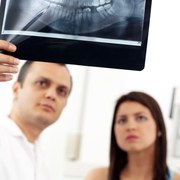 iStockphoto/Thinkstock
iStockphoto/Thinkstock
An April 2012 study, released in the medical journal Cancer, linked the increased exposure to dental X-rays to brain cancer. The study suggested that people who experienced bitewing dental X-rays yearly, or more frequently than others, were at an increased risk of developing the most commonly diagnosed cancerous brain tumor in the United States, which is meningioma.
The study recruited 1,433 people diagnosed with intracranial meningioma between May 2006 and April 2011 and interviewed them extensively about a variety of demographic details and medical history. Close attention was paid to the amount of dental work that patient had received and the number and type of dental X-rays they had over the years.
The study also followed 1,350 people who had no personal history of brain tumors but had similar age, sex, and location demographics for comparison.
The researchers found that those who had been diagnosed with meningioma were twice as likely to report having had bitewing dental X-rays then the comparison group. And those who had them annually or more frequently had a 40 - 90 percent higher risk of being diagnosed with a brain tumor at any age.
This study, led by Dr. Elizabeth Claus, professor at the Yale School of Medicine in New Haven, CT, focused on the effects of the ionizing radiation in dental X-rays which has been linked to brain tumors in the past. Dr. Claus found the prevalence of receiving bitewing X-rays to have an effect on the risk for a brain tumor.
Though Dr. Claus focused on bitewing X-rays, there are actually three types of dental X-rays US dentists use today:
• Bitewing: Provides a focused image of one specific area
• Full-mouth: A number of images of the whole mouth are taken
• Panorex: One panoramic image of the entire mouth
The study did find that that those who received Panorex X-rays prior to 10 years old, especially if they were done frequently, were up to five times more likely to be diagnosed with a meningioma.
Though the findings from this study would suggest that dental X-rays and specifically bitewing X-rays could be dangerous, experts caution against such a generality.
The American Dental Association released a reaction to this study, saying in part, “Dental X-rays are valuable in helping dentists detect and treat oral health problems at an early stage. Many oral diseases can't be detected on the basis of a visual and physical examination alone, and dental X-rays are valuable in providing information about a patient's oral health such as early-stage cavities, gum diseases, infections or some types of tumors.”
While there are some interesting findings within Dr. Claus’s study, it is important to understand its limitations as well.
This study relies on the patient's memories, which of course are not always accurate, and also doesn't take into account the fact that more radiation was used in the past. Also, experts struggle with the idea that bitewing X-rays are causing tumors, but full-mouth X-rays, which are a series of bitewing X-rays, do not.
Dental X-rays are an important diagnostic and treatment tool but should be done only when necessary. Patients should always be concerned about any level of radiation exposure to the head, but should not risk their dental health by refusing bitewing X-rays.
Sources:
Yahoo.com. Web. 11 April 2012. “Dental X-rays linked to common brain tumor.” http://health.yahoo.net/news/s/nm/dental-x-rays-linked-to-common-brain-tumor
ADA.com. Web. Published 10 April 2012. “American Dental Association: Dental X-rays Should be Used Sparingly To Reduce Radiation Risk”. http://www.ada.org/6972.aspx
Reviewed April 11, 2012
by Michele Blacksberg RN
Edited by Jody Smith




Add a CommentComments
There are no comments yet. Be the first one and get the conversation started!